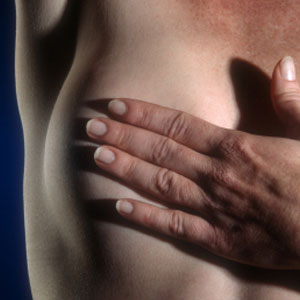
Doctors might better predict a woman's risk for breast cancer by tracking levels of key hormones, Harvard researchers report.
One expert said such a test could be useful.
"A large part of my practice involves counselling and educating women on their risk of developing breast cancer," said Dr Myra Barginear, a breast medical oncologist at North Shore LIJ Cancer Institute in Lake Success, New York. "If the study's findings are validated and confirmed, a simple blood test to evaluate hormone levels, as the investigators did in the study, would be a very useful, additional tool to evaluate a woman's risk of developing breast cancer."
According to the researchers, monitoring hormone levels could be added to markers already routinely looked at by physicians, including the number of pregnancies a woman has had and when she began menstruation.
Study author Shelley Tworoger, an associate professor of medicine at Harvard Medical School, Boston, explained that "postmenopausal women with high levels of the hormones oestrogens, androgen and prolactin, have a higher risk of breast cancer than women with low levels."
"At this point in time, however, no hormones are included in breast cancer risk prediction models," she said in a news release. However, the new study suggests that adding in levels of three hormones oestrone sulphate, testosterone and prolactin "may provide the biggest improvement in risk prediction for breast cancer," Tworoger said.
In the new study, her team analysed breast cancer risk for a group of 473 postmenopausal women diagnosed with invasive breast cancer, as well as 770 women without the disease.
Boosted accuracy
The researchers concluded that including the presence of high levels of key hormones boosted the accuracy of predicting those women at higher risk of invasive breast cancer.
According to Barginear, the finding "is not surprising and actually quite logical," especially since treatments for certain types of breast cancer hinge on lowering levels of hormones such as oestrogen.
She added that "evaluating these hormones to help predict the risk of breast cancer in a postmenopausal woman is most valuable, as over two-thirds of breast cancer occurs in postmenopausal women."
Dr Stephanie Bernik, chief of surgical oncology at Lenox Hill Hospital in New York City, said that while the findings are promising, "more work needs to be done before circulating hormone levels will be included" in routine estimates of breast cancer risk.
The study is to be presented Tuesday at the American Association for Cancer Research's annual meeting on cancer prevention, in National Harbour, Maryland. Findings presented at medical meetings are typically considered preliminary until published in a peer-reviewed journal.
More information
For more on breast cancer, visit the US National Cancer Institute.




 Publications
Publications
 Partners
Partners















